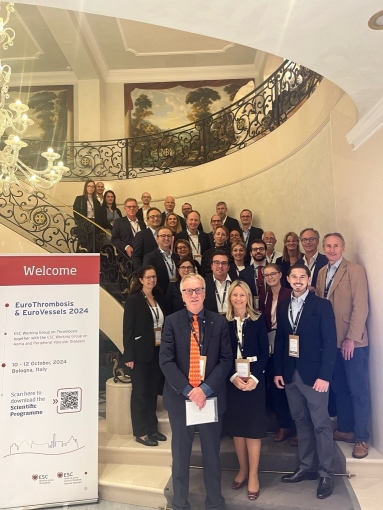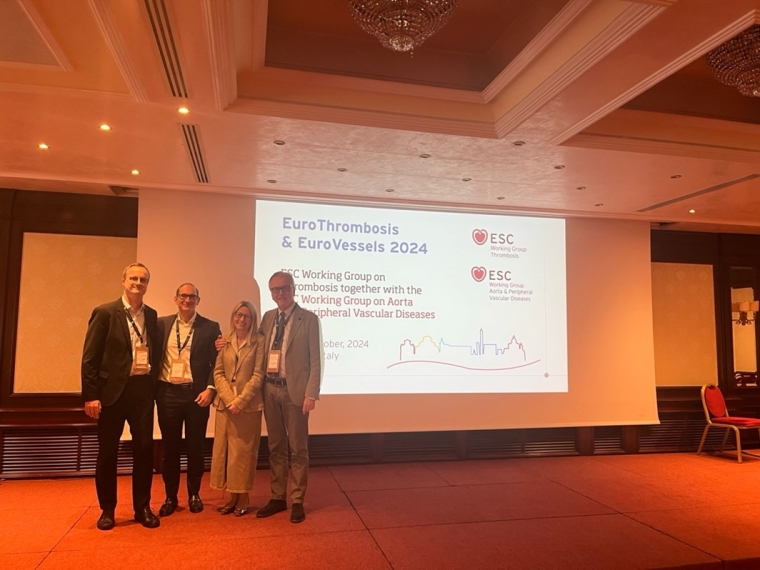As Chair of the ESC Working Group on Thrombosis for 2024-2026, I am grateful for the opportunity to serve you, as our members, clinicians, researchers and allied healthcare professionals, during this mandate.
In this newsletter, we share highlights from our very successful recent EuroThrombosis and EuroVessel 2024 conference, held in the beautiful city of Bologna, Italy. Summarised nicely by the lead for our Young Researchers group, Dr Bongiovanni, who shares our experience “from thrombosis to tortellini”.
Going forward, we have much planned for this mandate, including educational events, meetings, clinical and scientific documents, as well as collaborations with the many ESC groups who share our interest and passion for the prevention, risk stratification, identification and treatment of thrombosis in all its forms. We would love to hear from you if you have ideas and suggestions for our group.
Thank you for all your support and I look forward to working together with you all.
My best wishes
Professor Diana Gorog
Chair 2024-2026
ETEV 2024: sharing experience from thrombosis to tortellini
The ETEV 2024 Congress, held in Bologna under the auspices of the European Society of Cardiology's Working Group on Thrombosis and the Working Group on Aorta and Peripheral Vascular Diseases, was a significant event in the calendar of cardiovascular medicine. This multidisciplinary meeting brought together leading scientists and clinicians to discuss cutting-edge advancements in thrombosis, atherosclerosis, and vascular biology, emphasising both translational research and practical applications in clinical settings.

Among the distinguished speakers were some of the most respected figures in the field. Prof. Marco Valgimigli delivered a remarkable opening lecture on the individualisation of antiplatelet therapy post-acute coronary syndrome, setting the tone for the discussions that followed. Prof. Carlo Patrono’s lecture on the history and future of acetylsalicylic acid was another standout session, providing deep insights into one of the most pivotal drugs in cardiovascular treatment. Lastly, Prof. Gregory Lip's lecture on stroke prevention following the 2024 guidelines for atrial fibrillation addressed both certainties and remaining uncertainties, a topic of significant relevance to clinicians managing stroke risk.
The congress was notable for its comprehensive coverage of key areas, including anticoagulation therapy, mechanical thrombosis treatment, and inflammation in atherosclerosis. Sessions on factor XI inhibition in cardiovascular diseases, chaired by international experts, highlighted promising new pathways in thrombosis management. Hands-on tutorials and case-based discussions also played a vital role, fostering active participation from young researchers, thus ensuring that the next generation of scientists and clinicians remain engaged and well-prepared for future challenges.
The involvement of young colleagues through the Working Group on Thrombosis Young Researchers was an important inclusion, with their sessions contributing original research and clinical case discussions, further enhancing the diversity of perspectives at the congress.
The success of ETEV 2024 can also be attributed to its collaborative atmosphere. Attendees had ample opportunities for networking and exchanging ideas, with dedicated sessions that facilitated discussions between junior and senior faculty. The charming and historic setting of Bologna further contributed to the event’s success, providing the perfect backdrop for stimulating conversations and potential future collaborations.
As we reflect on the knowledge shared and the connections made, it is clear that ETEV 2024 was not only a forum for scientific exchange but also an event that will shape the future direction of thrombosis research and clinical practice. We eagerly look forward to continuing these discussions at future congresses building on the momentum generated in Bologna.


 Our mission: To reduce the burden of cardiovascular disease.
Our mission: To reduce the burden of cardiovascular disease.